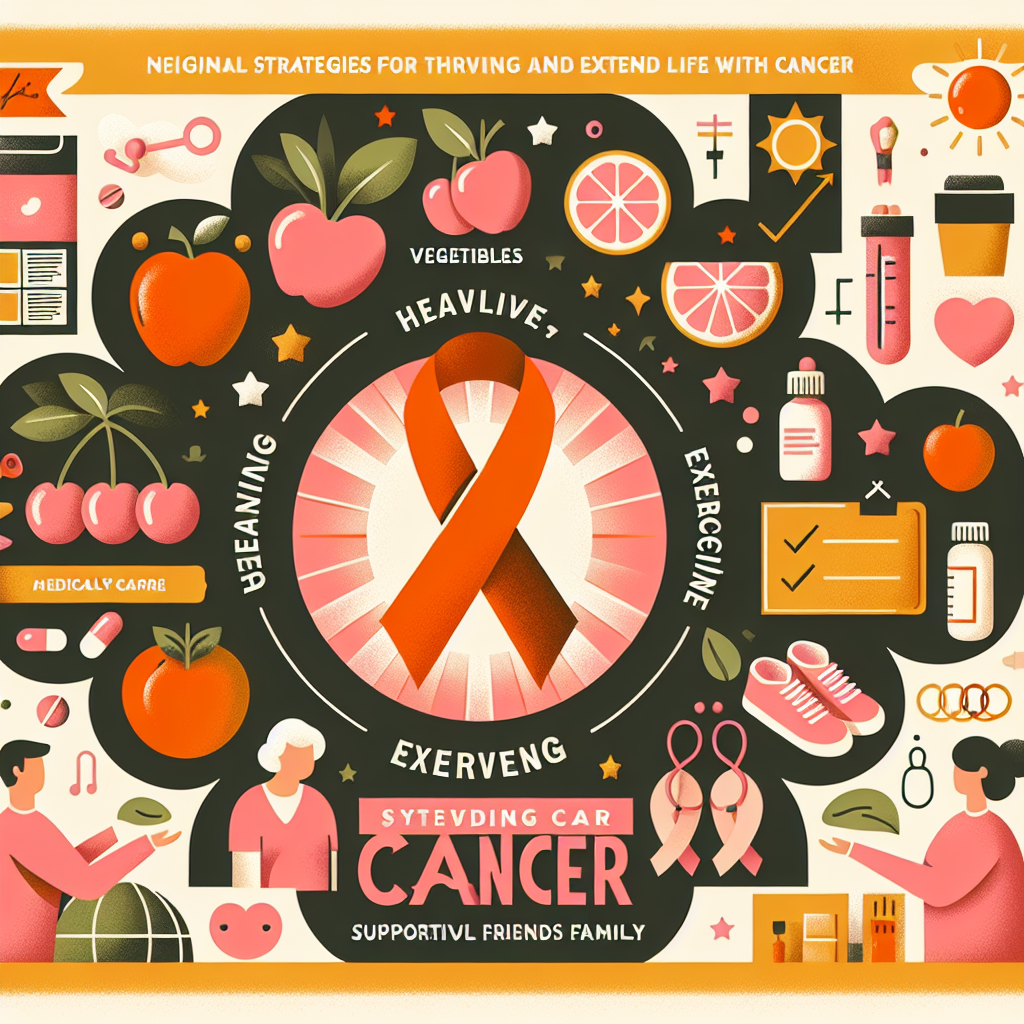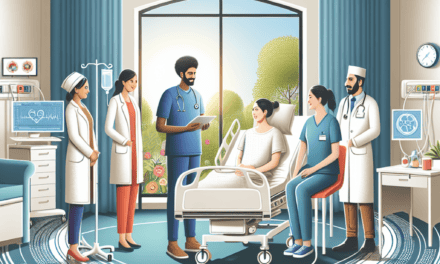Strategies for Thriving and Extending Life with Cancer

Cancer is a formidable adversary, affecting millions of people worldwide. However, advances in medical science, coupled with holistic approaches, have provided new avenues for patients to not only survive but thrive. This article explores various strategies that can help individuals extend their lives and improve their quality of life while living with cancer. We will delve into five key subtopics, each offering detailed insights and practical advice.
1. Embracing Medical Advancements
Medical science has made significant strides in cancer treatment, offering patients a range of options that can extend life and improve its quality. Understanding and embracing these advancements is crucial for anyone facing a cancer diagnosis.
1.1 Targeted Therapy
Targeted therapy is a revolutionary approach that focuses on specific molecules and pathways crucial for cancer cell growth and survival. Unlike traditional chemotherapy, which affects both healthy and cancerous cells, targeted therapy aims to minimize damage to normal cells.
For instance, drugs like Imatinib (Gleevec) have transformed the treatment landscape for chronic myeloid leukemia (CML) by specifically targeting the BCR-ABL protein. This has resulted in significantly improved survival rates and quality of life for patients.
According to a study published in the Journal of Clinical Oncology, targeted therapies have increased the five-year survival rate for certain cancers by up to 30%. This highlights the importance of personalized medicine in cancer treatment.
1.2 Immunotherapy
Immunotherapy harnesses the body’s immune system to fight cancer. It has shown remarkable success in treating various cancers, including melanoma, lung cancer, and bladder cancer.
Checkpoint inhibitors, a type of immunotherapy, work by blocking proteins that prevent the immune system from attacking cancer cells. Drugs like Pembrolizumab (Keytruda) and Nivolumab (Opdivo) have been game-changers in oncology, offering hope to patients with advanced-stage cancers.
Case studies have demonstrated that some patients achieve long-term remission with immunotherapy, even in cases where traditional treatments have failed. This underscores the potential of immunotherapy to extend life and improve outcomes.
1.3 Precision Medicine
Precision medicine involves tailoring treatment plans based on an individual’s genetic makeup and the specific characteristics of their cancer. This approach allows for more effective and less toxic treatments.
Genomic testing can identify mutations driving cancer growth, enabling oncologists to select therapies that target these mutations. For example, patients with non-small cell lung cancer (NSCLC) harboring EGFR mutations can benefit from targeted drugs like Osimertinib (Tagrisso).
Research published in Nature Medicine indicates that precision medicine can lead to better response rates and longer progression-free survival, emphasizing its role in extending life for cancer patients.
1.4 Advances in Radiation Therapy
Radiation therapy has evolved significantly, with techniques like intensity-modulated radiation therapy (IMRT) and stereotactic body radiation therapy (SBRT) offering more precise targeting of tumors while sparing healthy tissue.
These advancements have reduced side effects and improved outcomes for patients with various cancers, including prostate, breast, and brain cancers. Studies have shown that SBRT can achieve high local control rates, even in cases of metastatic disease.
By minimizing collateral damage, modern radiation therapy allows patients to maintain a better quality of life during and after treatment.
1.5 Combination Therapies
Combining different treatment modalities, such as chemotherapy, targeted therapy, and immunotherapy, can enhance their effectiveness. This approach is known as combination therapy and is increasingly being used to tackle complex cancers.
For example, the combination of chemotherapy and immunotherapy has shown promise in treating triple-negative breast cancer, a particularly aggressive form of the disease. Clinical trials have demonstrated improved response rates and survival outcomes with this approach.
Combination therapies offer a multifaceted attack on cancer, increasing the likelihood of achieving remission and extending life expectancy.
2. Adopting a Holistic Lifestyle
While medical treatments are essential, adopting a holistic lifestyle can significantly impact a cancer patient’s overall well-being and longevity. This section explores various lifestyle changes that can complement medical interventions.
2.1 Nutrition and Diet
Nutrition plays a vital role in supporting the body’s ability to fight cancer and recover from treatment. A balanced diet rich in fruits, vegetables, whole grains, and lean proteins can provide essential nutrients and antioxidants.
Research published in the Journal of Clinical Oncology suggests that a plant-based diet may reduce the risk of cancer recurrence and improve survival rates. Foods like berries, cruciferous vegetables, and fatty fish are known for their cancer-fighting properties.
Additionally, maintaining a healthy weight is crucial, as obesity is linked to an increased risk of cancer recurrence and mortality. Consulting with a registered dietitian can help patients develop personalized nutrition plans that support their specific needs.
2.2 Physical Activity
Regular physical activity has been shown to improve quality of life and increase survival rates for cancer patients. Exercise can help reduce fatigue, improve mood, and enhance overall physical function.
The American Cancer Society recommends at least 150 minutes of moderate-intensity exercise per week for cancer survivors. Activities like walking, swimming, and yoga can be tailored to individual fitness levels and preferences.
Studies have demonstrated that physically active cancer survivors have a lower risk of cancer recurrence and better overall survival compared to sedentary individuals. Exercise also helps manage treatment-related side effects, such as lymphedema and neuropathy.
2.3 Stress Management
Chronic stress can weaken the immune system and negatively impact cancer outcomes. Therefore, stress management techniques are essential for cancer patients seeking to thrive.
Mindfulness practices, such as meditation and deep breathing exercises, have been shown to reduce stress and improve emotional well-being. Cognitive-behavioral therapy (CBT) can also help patients develop coping strategies and address anxiety and depression.
Engaging in hobbies, spending time with loved ones, and seeking support from cancer support groups can further alleviate stress and enhance quality of life.
2.4 Sleep and Rest
Quality sleep is crucial for the body’s healing processes and overall health. Cancer patients often experience sleep disturbances due to treatment side effects and emotional stress.
Establishing a regular sleep routine, creating a comfortable sleep environment, and avoiding stimulants like caffeine can promote better sleep. In some cases, cognitive-behavioral therapy for insomnia (CBT-I) may be beneficial.
Adequate rest allows the body to repair itself, boosts the immune system, and improves cognitive function, all of which are essential for thriving with cancer.
2.5 Complementary Therapies
Complementary therapies, such as acupuncture, massage, and aromatherapy, can provide additional support for cancer patients. These therapies can help manage symptoms like pain, nausea, and anxiety.
For example, acupuncture has been shown to reduce chemotherapy-induced nausea and improve overall well-being. Massage therapy can alleviate muscle tension and promote relaxation.
While complementary therapies should not replace conventional treatments, they can enhance the overall treatment experience and contribute to a better quality of life.
3. Building a Strong Support System
A robust support system is invaluable for cancer patients, providing emotional, practical, and informational assistance. This section explores the importance of building and maintaining a support network.
3.1 Family and Friends
Family and friends play a crucial role in providing emotional support and practical assistance to cancer patients. Their presence can alleviate feelings of isolation and offer a sense of normalcy during challenging times.
Open communication with loved ones is essential for expressing needs and concerns. Encouraging family members to participate in medical appointments and treatment discussions can foster a sense of involvement and understanding.
Studies have shown that cancer patients with strong social support networks experience better psychological well-being and improved treatment adherence.
3.2 Support Groups
Support groups offer a safe space for cancer patients to connect with others facing similar challenges. These groups provide opportunities to share experiences, exchange information, and receive emotional support.
Many hospitals and cancer centers offer support groups led by trained facilitators. Online support communities also provide a convenient platform for connecting with others from the comfort of home.
Research published in Psycho-Oncology indicates that participation in support groups can reduce feelings of distress and improve quality of life for cancer patients.
3.3 Professional Counseling
Professional counseling can be a valuable resource for cancer patients dealing with emotional and psychological challenges. Licensed therapists can help individuals navigate complex emotions, develop coping strategies, and address mental health concerns.
Cognitive-behavioral therapy (CBT) and mindfulness-based stress reduction (MBSR) are effective therapeutic approaches for managing anxiety, depression, and stress related to cancer.
Accessing professional counseling services can empower patients to take control of their mental health and enhance their overall well-being.
3.4 Caregiver Support
Caregivers play a vital role in supporting cancer patients, but they also need support themselves. Caregiver burnout is a common issue, and addressing it is essential for maintaining a healthy support system.
Encouraging caregivers to seek respite care, join support groups, and prioritize self-care can help prevent burnout and ensure they can continue providing effective support.
Recognizing the contributions of caregivers and expressing gratitude can strengthen the caregiver-patient relationship and foster a positive support environment.
3.5 Community Resources
Community resources, such as non-profit organizations and cancer advocacy groups, offer valuable support services for cancer patients and their families. These resources may include financial assistance, transportation services, and educational programs.
Organizations like the American Cancer Society and CancerCare provide a wealth of information and support services to help patients navigate their cancer journey.
Utilizing community resources can alleviate some of the practical challenges associated with cancer treatment and enhance the overall support network.
4. Navigating Financial Challenges
Cancer treatment can be financially burdensome, but proactive financial planning and resource utilization can help alleviate some of the stress. This section explores strategies for managing the financial aspects of cancer care.
4.1 Understanding Insurance Coverage
Understanding health insurance coverage is crucial for managing the costs of cancer treatment. Patients should review their insurance policies to determine what services are covered and what out-of-pocket expenses they may incur.
Working with a financial counselor or patient navigator can help clarify insurance benefits and identify potential cost-saving opportunities. Additionally, patients should inquire about pre-authorization requirements for specific treatments.
Being informed about insurance coverage can prevent unexpected expenses and ensure access to necessary treatments.
4.2 Exploring Financial Assistance Programs
Numerous financial assistance programs are available to help cancer patients manage treatment costs. These programs may offer grants, co-pay assistance, and medication discounts.
Organizations like the Patient Advocate Foundation and the Leukemia & Lymphoma Society provide financial support services to eligible patients. Pharmaceutical companies also offer patient assistance programs for specific medications.
Researching and applying for financial assistance programs can significantly reduce the financial burden of cancer treatment.
4.3 Budgeting and Financial Planning
Creating a budget and financial plan can help patients manage their finances during cancer treatment. This involves tracking expenses, prioritizing essential costs, and identifying areas where savings can be made.
Patients should consider consulting with a financial advisor to develop a comprehensive financial plan that accounts for medical expenses, income changes, and long-term financial goals.
Effective budgeting and financial planning can provide peace of mind and allow patients to focus on their health and well-being.
4.4 Employment and Disability Benefits
Cancer treatment may impact a patient’s ability to work, making it essential to explore employment and disability benefits. Patients should communicate with their employers about their diagnosis and treatment plan to discuss potential accommodations.
For those unable to work, applying for disability benefits through programs like Social Security Disability Insurance (SSDI) or Supplemental Security Income (SSI) can provide financial support.
Understanding employment rights and accessing disability benefits can help patients maintain financial stability during treatment.
4.5 Legal and Estate Planning
Cancer patients should consider legal and estate planning to ensure their wishes are respected and their loved ones are protected. This may involve creating a will, establishing a power of attorney, and designating healthcare proxies.
Consulting with an attorney specializing in estate planning can help patients navigate these legal matters and ensure their affairs are in order.
Proactive legal and estate planning can provide peace of mind and reduce stress for both patients and their families.
5. Staying Informed and Empowered
Knowledge is power, and staying informed about cancer and its treatment options empowers patients to make informed decisions about their care. This section explores strategies for staying informed and empowered throughout the cancer journey.
5.1 Researching Treatment Options
Cancer patients should actively research their treatment options to understand the potential benefits and risks of each approach. This involves reviewing reputable sources, consulting with healthcare providers, and seeking second opinions when necessary.
Online resources, such as the National Cancer Institute and American Cancer Society websites, provide comprehensive information on various cancer types and treatment modalities.
Being well-informed about treatment options allows patients to participate actively in their care and make decisions aligned with their values and preferences.
5.2 Participating in Clinical Trials
Clinical trials offer access to cutting-edge treatments and contribute to advancing cancer research. Patients should consider participating in clinical trials as a way to explore new treatment options and contribute to scientific progress.
Oncologists can provide information about available clinical trials and assess eligibility based on the patient’s specific cancer type and stage.
Participation in clinical trials can offer hope for improved outcomes and provide valuable insights into the effectiveness of new therapies.
5.3 Advocating for Personalized Care
Cancer patients should advocate for personalized care that considers their unique needs and preferences. This involves open communication with healthcare providers and actively participating in treatment planning.
Patients should feel empowered to ask questions, express concerns, and seek clarification on any aspect of their care. Building a collaborative relationship with the healthcare team can enhance the overall treatment experience.
Advocating for personalized care ensures that treatment plans align with the patient’s goals and values, ultimately improving quality of life.
5.4 Staying Updated on Research and Innovations
The field of oncology is constantly evolving, with new research and innovations emerging regularly. Staying updated on the latest developments can provide patients with valuable insights into potential treatment options and advancements.
Subscribing to reputable medical journals, attending cancer conferences, and following trusted cancer organizations on social media are effective ways to stay informed.
Being aware of research and innovations empowers patients to explore new possibilities and make informed decisions about their care.
5.5 Engaging in Self-Advocacy
Self-advocacy involves taking an active role in one’s healthcare journey and making informed decisions about treatment and lifestyle choices. Patients should feel empowered to voice their preferences and seek the best possible care.
Engaging in self-advocacy may involve seeking second opinions, exploring alternative treatment options, and advocating for supportive care services.
By taking charge of their healthcare journey, patients can enhance their sense of control and improve their overall well-being.
Conclusion
Thriving and extending life with cancer requires a multifaceted approach that combines medical advancements, holistic lifestyle changes, strong support systems, financial planning, and empowerment through knowledge. By embracing these strategies, cancer patients can improve their quality of life, enhance treatment outcomes, and find hope in the face of adversity. As research continues to advance, new possibilities for thriving with cancer will undoubtedly emerge, offering even greater opportunities for patients to live fulfilling lives.





